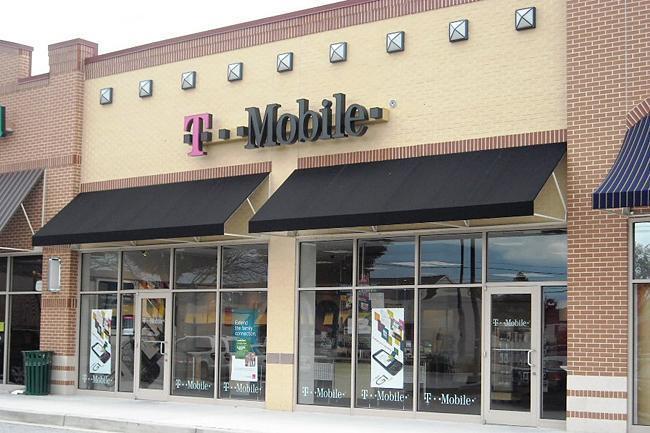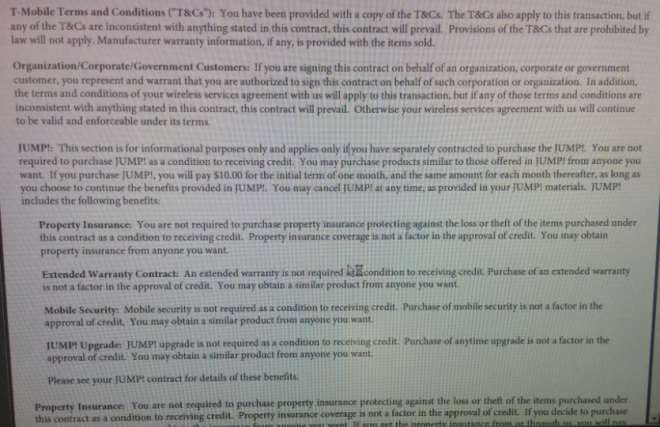Complaints of “forced” JUMP! additions point to same old weakness in sales culture
I’ll start of this post by saying one thing: I used to be a sales person. I worked for two different companies in the UK. I’ve seen practices very similar to what I’ve been reading about this morning in real life. So this is in no way an attack on T-Mo, but more on the culture that’s grown within the retail and sales arena. I’m in a country thousands of miles away, and it happens here too. But that doesn’t make it okay.
I’ve watched as sales staff sneakily add insurance on to people’s accounts without asking them, even get them to sign the paperwork without telling them why they’re signing. Either that, or tell them that they can’t have a specific great offer unless they add insurance too, or refuse to sell them an in-demand phone if they don’t take a data bundle with the device. If the high-demand handset is in particularly low stock, I’ve been ordered to refuse sale to people if they’re upgrading, selling only to new connections and then only if they agree to take insurance, plus a data bundle on their contract.
It happens in sales everywhere. Not just in T-Mobile stores.
Sometimes these orders come from regional area managers. Some times from store managers. It’s incredibly unlikely that sales practice suggestions like this come from anyone higher up. If it is, it’s on the “down low” and “didn’t come from them”.
It’s unclear how many stores and sales staff are involved in “forced JUMP! additions”. I can’t imagine that it’s a high percentage, or a huge widespread issue, but the fact that it’s happening at all points towards the same old motivations in sales. And it points towards one thing: The focus is in the wrong place. The focus is on money and targets, instead of leaving the customer with the best possible experience.
Some staff may point towards the ridiculously high penetration targets for bundles and add-ons as the reason behind their actions. Or the threat of disciplinary procedures if they aren’t meeting those targets. And to some extent, I can understand that.
A couple of cases have cropped up on the always-insightful T-Mobile subreddit. First-off, one customer wanted to get a $99 phone on EIP:
“The manager insisted that everyone is required to purchase the Jump Plan if the EIP is used for a purchase in a retail store. When asked why anyone would need Jump Plan for a $99 phone he told me it was required because T-Mobile wants to protect my phone. Thanks T-Mobile, but I am actually able to take care of my phone by myself.”
Sure, it helps the sales staff and store meet some targets, and the customer can cancel the Jump plan whenever they want. But that doesn’t leave the customer feeling as good about their purchase from T-Mobile as what they could have. I hate to be the “regional trainer guy” who comes in and spews positive naiveties about how the services should sell themselves etc. But if the customer doesn’t want to pay for something extra, and you’ve done all you can to outline its features and benefits, then they ain’t gonna buy.
JUMP! in and of itself is really great, in that it allows customers to upgrade whenever they want, and insures the device at the same time. Perhaps it doesn’t make as much sense on the lower end phones. After all, if you have a $99 phone and you get bored of it, it’s not going to leave you bankrupt if decide you’ve had enough and want to end your EIP agreement by paying it off.
Another customer complains that they weren’t allowed to take 3 lines on the base Simple Choice plan for $90. He went in to store wanting three lines, and knew already that he could get them for $90. It’s basically the 4-for-$100 deal, minus one of the lines. He signed up, left and discovered that his bill was $100. Not $90.
I asked him why it was $100 and not $90 and he explained that his manager required at least 1 line to have 3gb of high speed data (which is $10 more). I questioned why they advertised $100 for 4 lines on the window and were charging me $100 for 3. I kept repeating my question and he became very nervous and went to the back to call his manager. About 15 minutes later he was back and said “congratulations, my manager allowed me to give you the plan without extra high speed data”. I asked him why he had to get manager approval first and he said that most people got Tmobile, ran out of data, and came back angry that their internet was slow. Is this even allowed by Tmobile?
The answer to the question is, no. It isn’t allowed. Whatever the excuses given for the sly addition of an extra bundle, or higher plan, it has to be the customer that agrees to it.
Another practice that we’ve become aware of in regards to Jump is staff offering incentives to get on the program. A form of reimbursement is offered, in which case, the customer knows they’re getting it and they know they don’t have to have it. But in this case, they have nothing to lose, and aren’t out of pocket. Sales staff hits targets, customer gets a cool service on a “trial” period. Win, win. I have no issue with that practice personally.
So what’s the answer?
Like I say, it’s almost certainly not a huge, widespread issue within T-Mobile. But the practices of sneaking services on to accounts just to hit targets is plain wrong. It’s the plague of the retail world and needs to be wiped out.
Here’s a well-known, but often forgotten, secret in the consumer market: Happy customers make loyal customers. The ones you mislead, the ones you leave frustrated or feeling ripped off are the ones who will not come back again. Which ever way you like at it, it’s bad business. You may get a little financial reward in the immediate term. But in the long term, not so much. And we all know customers are more likely to share bad experiences with their friends and family, than they are to share positive ones. Therefore, losing you even more potential future customers.
Here’s a question to retail staff: What can T-Mobile do to ensure this doesn’t continue, even if it is at a very minimal scale?
Personally, I feel that the people making these dishonest decisions to “force” additional services will always do it while there’s any form of target in place. As long as it benefits them personally in some way. But I also know targets are necessary as a motivation to honest and decent sales people, but also as a measure of performance. So we can’t get rid of those completely. But can T-Mo do anything to reduce their importance? In the UK, while it was still in existence, T-Mobile started basing staff bonus on their customer satisfaction ratings rather than sales numbers. Just as an example.
Customers: Have you ever been forced to take a service or bundle you don’t want? Or get home to find one hidden that you weren’t informed of? Not just at T-Mobile, but anywhere?
Also, as help to those looking to buy, nowhere in the JUMP! terms does it say that you have to take it if you want EIP. It’s optional. And you can cancel whenever you like.


